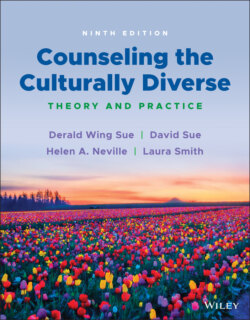Читать книгу Counseling the Culturally Diverse - Laura Smith L. - Страница 10
CHANGES TO CCD
ОглавлениеMuch new research has been conducted on multicultural counseling, cultural competence, and social justice advocacy, alternative roles of helping professionals, White allyship, microaggression/microintervention theory, and culture‐specific interventions over the past few years. In essence, the topical areas covered in each chapter continue to anchor multicultural counseling coverage. As a result, while many chapters remain similar, each has undergone major revisions; some are quite extensive in the updating of references, introduction of new research and concepts, and discussion of future directions in counseling, therapy, and mental health.
Additionally, in light of the current societal upheaval and political bias and bigotry directed toward marginalized groups in our nation, one of the lenses used to analyze mental health practice must be sociopolitical in nature. To avoid doing so or to discuss these concepts superficially are to continue the oppression and silencing of diverse populations. Thus, we have updated and in some cases expanded our coverage of how such factors influence the profession. Studying systems of oppression is a necessary step to cultural competence. We consider it a serious omission not to discuss counseling diverse populations without acknowledging and dissecting the issues of marginality, oppression, and the current sociopolitical climate on mental health practice.
For example, the horrendous murder of George Floyd on May 25, 2020, and the historical and continuing killing of unarmed Black Americans, our nation has seemingly experienced a racial awakening of its racist historical past, and its continuing oppression, denigration, and silencing of Black, Indigenous and People of Color (BIPOC). Further, the COVID‐19 pandemic has laid bare the existence of systemic racism, and while it threatens the well‐being of humankind as a whole, it has most affected communities of color and poorer ones. Counseling and psychotherapy with marginalized group members do not occur in a vacuum. Issues of individual and systemic bias, prejudice and discrimination often rear their ugly heads in mental health practice. Being culturally competent requires practitioners to confront themselves as racial/cultural beings, to acknowledge the institutional biases of the mental health profession, and to change systems of oppression in our society.
